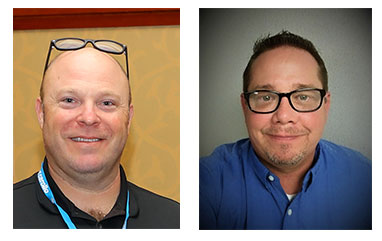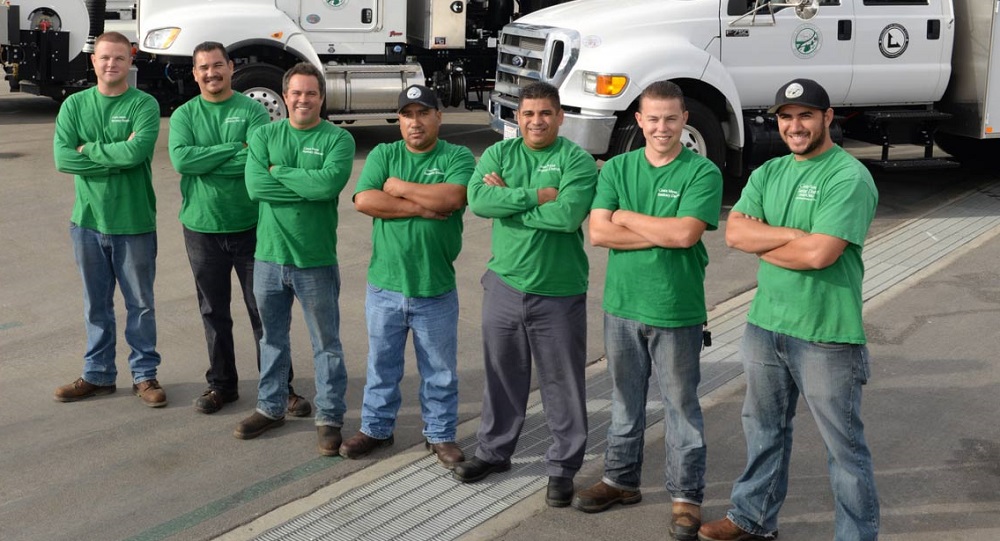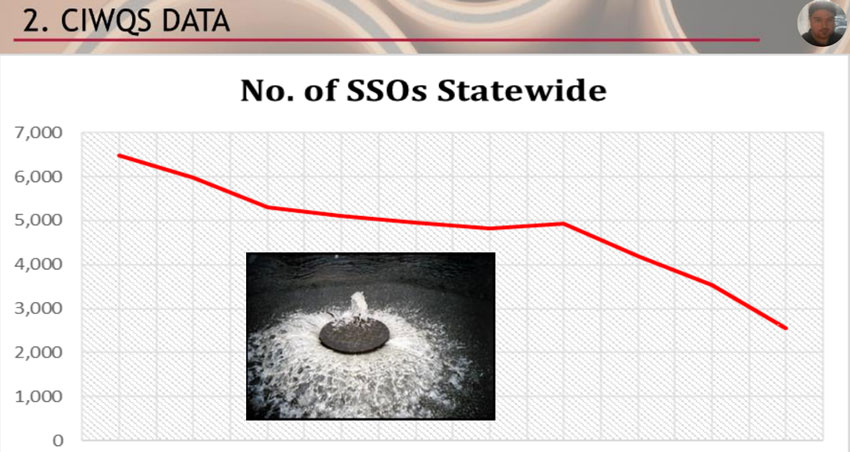
Interview with Daryl Lauer (l) and Ken Merkle (r)
Two collection system leaders discuss the importance of certification and the role training and technology have in the massive reduction in Sanitary Sewer Overflows. Daryl Lauer is the Collections Superintendent for Carmel Area Wastewater District the Chair of CWEA’s Collection Systems Committee. Ken Merkle is the Senior Collection Systems Supervisor for the City of Stockton and a member of CWEA’s Board of Directors. Together, they have over 50 years of experience in the water sector.
Why require Collection System Maintenance Certification in the revised WDR regulations?
Daryl Lauer: I believe regulators are becoming more and more aware of collection systems to begin with. We are on year 12 of the WDR and they’re looking at revising it. They realize how important it is to have staff who know what they’re doing.
That’s why I believe they should require certification because they’re going to get better skilled collection system professionals. Someone out there preventing SSOs. That’s the bottom line, stopping the SSOs. There are districts and cities getting down to no spills for a year, no spills over two years. The method of more training and certification, that’s working.
Ken Merkle: I think it closes the loop. Wastewater treatment plant operators are required to be certified. Water Distribution and Water Treatment Plant Operators have to be certified. They have to show they have the competency and knowledge, skills and abilities to run treatment plants and distribution systems.
Regulators are starting to believe and feel it’s the same way for the Collection System Operators. We should have a continuous loop in the water cycle from treatment to distribution, through waste collection, treatment and reuse.
It’s important for the profession and regulators to realize the current practice of not requiring certification leaves an open loop system of the water cycle. That has created in California some legal liability and that is what is opening the door for so many third party environmental groups to file lawsuits.
If the WDR were to address professional certification, it would close that loop and let each of our communities know we are serious about operating the system correctly. The people operating the water plants, wastewater plants, and the distribution and collection systems are competent in doing their jobs.

Carmel Area Wastewater District’s Collection Systems Team
What does Collection System Maintenance certification mean for your team?
Daryl: For me and my team it’s a standard of knowledge and skills that we can use. For the District we incorporate CWEA certification into our career levels. Collections Worker I, Collections Worker II, Collections Worker III, Manager. We’ve incorporated the certification into each level. It’s the standard you achieve in order to move up. It’s a way for us to test a person’s knowledge.
Ken: I know of other agencies similar to Daryl’s. They have Utility Operator I, II, III, and your promotion is dependent upon certification. Taking a certification exam means the person is dedicated to being a professional in wastewater collections.
To me, certification means I’ve done my homework to show competence in all areas of a wastewater collections. I’ve taken the time to study and put in the effort to show my professionalism and dedication to getting certified. My effort to become part of a team. – Ken Merkle

Members of the CMSD Collection Systems Team. All hold CWEA Collection System Maintenance certification.
What do you highlight as the benefits of certification for an agency?
Ken: I definitely think the agency benefits in two important ways. One is assuring competence in the staff. They are familiar with the technologies and safety. It creates a high level of competency in the people who have passed the certification and work for the agency.
The second note is I’ve seen in Southern California the Regional Boards is now ordering agencies to certify their collection systems staff. I haven’t seen CWEA certification required specifically, but they are requiring agencies to certify their staff is competent and trained. Not only to respond to sewer overflows, but in maintaining the sewer system.
Daryl: Ken and I had this conversation multiple times. For me and our district, it’s a standardization in the way to test employees about their knowledge. It’s a platform that is widely respected. CWEA is known throughout the country. It’s a way for you to say, “Hey, look, my employees all meet this standard.”
You can encourage team members to move up. They’ve gone above Collections Grade I to become a Grade II and they have the base of knowledge for it.
From the regulator’s standpoint, certification is something you can show regulators that you have a staff of competent and trained people. I’m blessed to have guys on my team who are all trained up. I set their goals at Grade IV, nothing lower.
More water agencies are providing a pay bump for employees who achieve multiple certifications, do you think this is a positive trend for the water sector?
Ken: I think it depends on the size of the agency. In smaller agencies, the employees are required to do work in multiple areas. They may need collections certification, and a mechanical certification. They may need electrical or instrumentation certification. In some small agencies they do it all. They even have to do some lab work.
So, I think it is very valuable, that the agencies are providing additional pay for each type of certification. Here in Stockton we get a onetime add pay based on the grade level you have passed.
Daryl: So in our District we do not have incentive pay to collect additional certifications. However, we do highly recommend other certifications in our job descriptions. So, we recommend maintenance certifications for all of our staff. We are a small district with 20-25 employees, being cross certified is hugely important for us.
Is it difficult for agencies to implement collection systems certification?
Ken: I don’t think it’s necessarily difficult. I think it’s a change in class specifications. But I think it’s something that certainly is not that hard to do. It may have a small financial cost, but, agencies set their pay rates. It’s not going to have a significant cost. CWEA provides the training and certification guidance. There’s enough certified professionals in California that we can provide the training and help those in need.
Daryl: This is again a conversation Ken and I have had many times. I understand it will be difficult at first for cities or municipalities struggling to compete with other agencies for personnel. But for me, for our District, we’ve required it for years now, so to us it will be no different.
The District does see the certifications as very valuable. I mean, every time a team member passes a certification exam they meet with our Board of Directors to celebrate. The Board is very appreciative and serious about how much they appreciate it. It shows that you know what you’re doing, you’re dedicated, and that you care about your career.

Data from CIWIQS shows a steep decline in SSOs in CA.
There’s been a massive drop in the number of SSOs across CA. How far has the profession come?
Ken: I think technology as well as the knowledge of the operators, have been a major contributor to the drop in quantity of SSOs. We have better equipment, better trained people. I think one of the reasons for that is the third party NGO lawsuits and consent decree orders from regulators.
I think sewers were out of sight, out of mind since it was underground. People didn’t really pay much attention until the third party lawsuits really brought SSOs to light and there were beach closures in Southern California.
Just the awareness of water and scarcity of water with the droughts, has also brought water and sewers into the light. People didn’t report a clean-out overflowing years ago. Now if the public sees water trickling anywhere they report it right away.
What was once underground is now up in front for people to see.
Daryl: Ever since I’ve been involved, the tools and equipment and technology have gotten so much better. So, where operators, technicians and collection system workers have demanded better stuff, the equipment world is answering. The technology is so much better they’re putting tools in our hands to respond quickly and get the answers we need quickly.
The second thing, since the WDR was enforced 12 years ago we’re seeing more and more people attend training. More professionals are getting involved in CWEA, in certification and in workshops.
I think the biggest turning point, at least for my District, is you have other districts and municipalities sharing their methods and procedures for solving issues. Everyone is sharing ideas through CWEA or putting it into print so we can share ideas. Those best practices are spreading across the State.
You have a few districts that can throw more funding and resources at research and training, and they’re leading the way for the smaller districts.
We may never have learned how to get better if not for these leading agencies. That’s huge and they love sharing the knowledge.
We’re kind of far away from everybody else up here on the coast. Now I feel like I’m in touch with the entire state even though I’m far away.
Thank goodness for Sacramento Area Sewer district, Orange County Sanitation District, South Placer MUD, Union Sanitary District, Oro Loma Sanitary District and others. They have really stepped up and supported the spread of knowledge in our profession. – Daryl Lauer
What was it like taking your first certification exam?
Daryl: My first, if I could step back, was 17 years ago, we actually sat in a classroom all together for the exam. Yes, I was really nervous because, again, at our District, we had to get the Grade I within 12 months or you could be dismissed from your job if you didn’t pass.
After getting the Grade I it became a personal goal for me. I just wanted to continue. Certification exams weren’t as hard as I thought it was going to be, as long as you studied.
Ken: The first exam I took in wastewater was actually the Wastewater Operator Certification Program 30 years ago. I was pretty overwhelmed by it. I was surprised by the amount of math and chemistry. After passing the wastewater certification, I wanted to try other areas of the profession, so I got into collections. Tith my experience and training, I was able to go straight for the Grade II exam.
As I progressed up to Grades III and IV, I’ve always done sufficient studying to pass them on the first try luckily. I use the CWEA certification test prep classes, not so much to actually get the material, but to familiarize myself with the exam process. The certification test prep sessions are not going give you the answers. You have to do the work yourself.
When somebody asks you how they get your job, what’s your advice?
Daryl: So, the funny thing is I asked that same question to my boss about 16 years ago. “How do I get your job someday?” He basically said the exact same thing I will tell you, number one, get your certifications. Be ready when opportunity comes knocking, you have the certification that’s required for that job position.
If the job requires a Grade III, get the Grade IV.
Then put in the time and you gotta put in the effort to be qualified so that when the time does come. Set your goals high, I didn’t stop until I was sitting where I’m sitting at today as the manager. Once you set your goal, continue, follow up with it. I want the younger generation to know water is a career, stick to it and you’ll go far.
Ken: Well we come from different generations and I started old school before computers and everything was done on paper. For young people now, I encourage them to take the correspondence classes from the Office of Water at Cal State Sacramento. They have great programs for all areas of water.
Like Daryl said, be prepared. When I first started trying to move up, I asked my boss how to get his job, and he told me, I needed to have computer experience. I had to go back to Adult Ed school to take computer classes on my own time, so I would have the skills and abilities to take over that higher position when the opportunity arose. So keep learning, be a lifetime student.
To learn more about CWEA’s certification program visit cert.cwea.org.